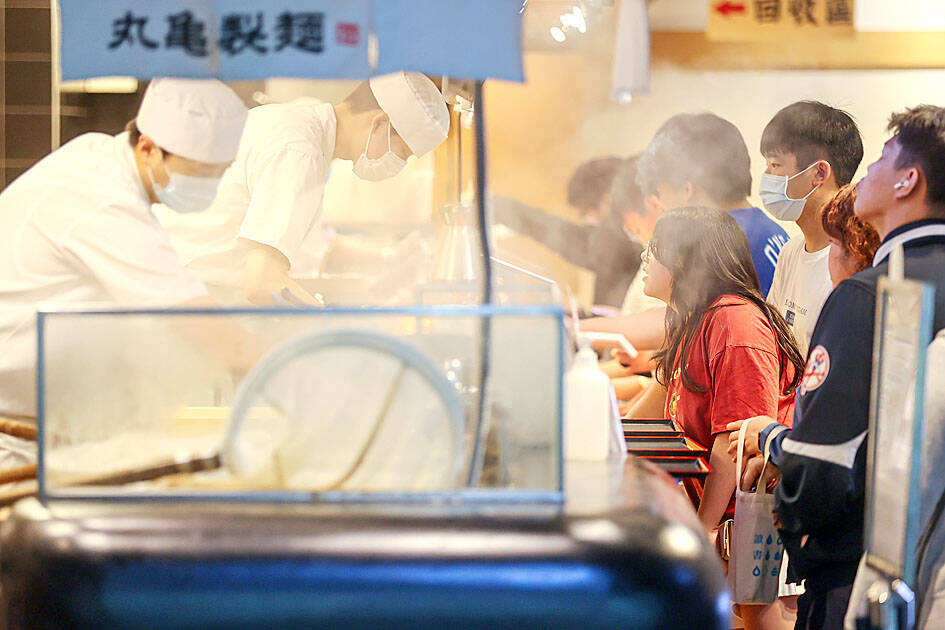Sales in the retail, and food and beverage sectors last month increased 1.6 percent and 0.7 percent respectively from a year earlier, decelerating from rises of 1.9 percent and 10.5 percent the previous month, the Ministry of Economic Affairs said yesterday.
Wholesale sector sales last month grew by 16.2 percent annually, accelerating from a 4.1 percent increase in March, mainly due to strong demand for artificial intelligence (AI) and high-performance computing (HPC) technologies, an increase in non-tech goods exports and inventory restocking ahead of Mother’s Day, the ministry said in a report.
Retail, and food and beverage sales this month would continue to increase year-on-year, benefiting from Mother’s Day promotions, seasonal demand for iced beverages and home appliances, and the launch of new vehicle models, the ministry said.

Photo: CNA
The ministry also said it expects wholesale sector sales to grow on an annual basis for the third month in a row, given rising uptake of AI and HPC applications, coupled with restocking demand in preparation for new business opportunities.
Last month, retail sector sales were NT$387.2 billion (US$12.01 billion), the highest April sales, driven mainly by higher consumption at supermarkets and convenience stores, e-commerce sites, cosmetics outlets, automobile vendors and information technology and consumer electronics stores, despite slowing sales at department stores, hypermarket outlets and apparel shops, the report said.
In the first four months of this year, retail sales totaled NT$1.57 trillion, up 3.2 percent from a year earlier, and are expected to grow up to 2.5 percent annually to between NT$389.6 billion and NT$401.3 billion, the ministry said.
Sales in the food and beverage sector reached NT$80 billion last month, as growth in in-flight meals supported catering services and Tomb Sweeping Day increased family gatherings, even though several food safety incidents affected restaurant sales, the report said.
In the first four months, food and beverage sales rose 5 percent year-on-year to NT$344.1 billion, the ministry said, forecasting sales this month would grow 4.5 to 7.5 percent annually to between NT$85.2 billion and NT$87.6 billion.
Wholesale sector sales were NT$1.06 trillion last month on the back of strong demand for machinery equipment, chemical materials, food and tobacco products, and medicines and cosmetics, the report said.
Cumulative sales in the first four months grew 9.5 percent to NT$4.1 trillion, and would rise by 10 to 13 percent annually this month to between NT$1.05 trillion and NT$1.07 trillion, the ministry said.

SETBACK: Apple’s India iPhone push has been disrupted after Foxconn recalled hundreds of Chinese engineers, amid Beijing’s attempts to curb tech transfers Apple Inc assembly partner Hon Hai Precision Industry Co (鴻海精密), also known internationally as Foxconn Technology Group (富士康科技集團), has recalled about 300 Chinese engineers from a factory in India, the latest setback for the iPhone maker’s push to rapidly expand in the country. The extraction of Chinese workers from the factory of Yuzhan Technology (India) Private Ltd, a Hon Hai component unit, in southern Tamil Nadu state, is the second such move in a few months. The company has started flying in Taiwanese engineers to replace staff leaving, people familiar with the matter said, asking not to be named, as the

The prices of gasoline and diesel at domestic fuel stations are to rise NT$0.1 and NT$0.4 per liter this week respectively, after international crude oil prices rose last week, CPC Corp, Taiwan (台灣中油) and Formosa Petrochemical Corp (台塑石化) announced yesterday. Effective today, gasoline prices at CPC and Formosa stations are to rise to NT$27.3, NT$28.8 and NT$30.8 per liter for 92, 95 and 98-octane unleaded gasoline respectively, the companies said in separate statements. The price of premium diesel is to rise to NT$26.2 per liter at CPC stations and NT$26 at Formosa pumps, they said. The announcements came after international crude oil prices

A German company is putting used electric vehicle batteries to new use by stacking them into fridge-size units that homes and businesses can use to store their excess solar and wind energy. This week, the company Voltfang — which means “catching volts” — opened its first industrial site in Aachen, Germany, near the Belgian and Dutch borders. With about 100 staff, Voltfang says it is the biggest facility of its kind in Europe in the budding sector of refurbishing lithium-ion batteries. Its CEO David Oudsandji hopes it would help Europe’s biggest economy ween itself off fossil fuels and increasingly rely on climate-friendly renewables. While

SinoPac Financial Holdings Co (永豐金控) is weighing whether to add a life insurance business to its portfolio, but would tread cautiously after completing three acquisitions in quick succession, president Stanley Chu (朱士廷) said yesterday. “We are carefully considering whether life insurance should play a role in SinoPac’s business map,” Chu told reporters ahead of an earnings conference. “Our priority is to ensure the success of the deals we have already made, even though we are tracking some possible targets.” Local media have reported that Mercuries Life Insurance Co (三商美邦人壽), which is seeking buyers amid financial strains, has invited three financial